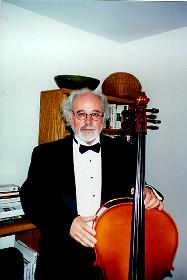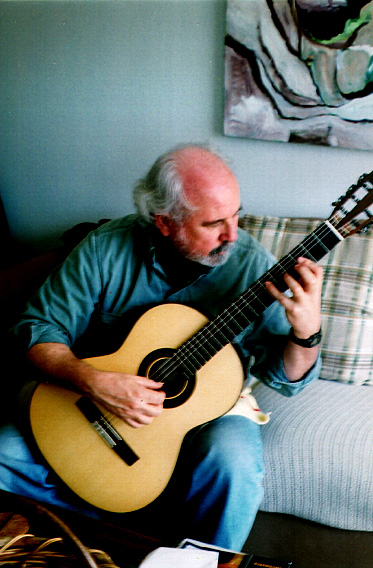Arnie Williams |
 |
Arnie Williams |
 |
I was born and raised (at least through my freshman year of high school) in the small farming community of Earth, Texas, pop. 1,200 and dwindling (it's halfway between Lubbock and Amarillo in northern Texas for those who know the state). My father worked for the county as a heavy equipment operator; my mother was a waitress at the local café. Neither of them had more than a junior-high education and so our house was not one stocked with books or other items of learned culture. My mother was a singer-songwriter guitarist, however, and while her heart-felt lyrics were simple fare in the country-music vein, I still credit her with instilling in me a love of music.
The schools in Earth were so small that when I entered seventh grade, I was admitted to the high school band as one of four euphonium players (if you don't know what a euphonium is, just think tenor tuba). From then through the eleventh grade I thrived on band music. Texas has excellent music programs, even in the smallest schools (which typically don't have an orchestra or string program). I excelled at the craft of euphonium playing and frequently took all-region band honors as well as scoring gold medals in solo contests.
I was such a favored player by all of my many band directors (I had two in Earth, then moved to Canyon for my sophomore year under conductor Lee Boyd Montgomery [famous in Texas band circles], then attended three separate schools my junior year under three different conductors). All the band directors I worked with encouraged me to pursue a music major in college and were helping me to lay down the appropriate foundation in scale work and Arban foundation studies. (I couldn't afford private lessons).
Then at the end of my junior year, I experienced an especially frustrating summer of not being able to find work. Not wanting to burden my parents, who were struggling financially and would not be able to cover the many costs associated with my senior year, I decided to quit school and join the Navy. Of course, my mother was deeply disappointed, thinking that without a high-school education I would be doomed to the kind of hourly-wage hard-labor jobs that she and my father had faced throughout their lives. I understood her disappointment, but ever the independent soul, decided nevertheless to jump headlong into the Navy without a backward glance. Besides, I was from land-bound Texas and yearned for different landscapes -- particularly seascapes.
I entered Navy boot camp in San Diego, CA, in July of 1965, thinking that I would audition for Navy music school and still be able to pursue a career in music. I did join the Navy Recruit Training Command's drum and bugle corps as the principal baritone bugler. This position meant that I was in charge of sectional rehearsals and also participated in countless parades outside of the Navy base -- and weekly parades for boot camp graduates and their families.
I also auditioned for Navy music school and passed the audition with flying colors; however, the Navy had other plans for me. It seems that I had a very high aptitude for Morse code communications and also for languages (even though I had never studied a language in school nor listened to a single dot or dash from area Ham operators). So masterfully following military logic, instead of sending me off to music school as I had hoped, the Navy sent me to Pensacola, Florida, to study Morse-code communications and Navy intelligence. I was soon serving a stint in Vietnam based in Danang and flying daily reconnaissance missions. Within a short time after that, I found myself in Monterey, California, at the Defense Language Institute studying first Portuguese and then later Russian. Much of my 12 years in the Navy were then spent as a linguist involved in intelligence work.
Much to my mother's delight, I not only finished high school (GED), but went on to earn BA and MA degrees in English at the University of Texas following my stint in the Navy. I also got married, had two children, got divorced, and then married again. Moving far away from Texas (and unfortunately from my children), I settled in Northern California and pursued a life of magazine journalism, almost completely forgetting my original love for music and how it had sustained me through my bleak upbringing in small-town Texas.
Then miracle of miracles, my daughter who had graduated from college with a degree in Opera performance (University of West Florida) came to live with me for a year or so while she resettled in California. It was hearing her do her daily Vaccai exercises and voice warm-ups and seeing her perform in area musicals that re-awakened my interest in music. At first I began classical guitar lessons, but every time I went to hear the symphony, my ears and eyes always snapped to and then stay glued to the cello section. So at age 53 I finally decided to stop resisting fate. I e-mailed the Santa Rosa Symphony asking for referrals to cello teachers in my area, called up one of the players recommended to me who lived only a 15-minute drive from my house, and was soon on my way.

I didn't come to my first lesson empty-handed. I think I may have overwhelmed my teacher just a bit because, by our first lesson, I had already purchased the three-volume Dotzauer method books, Klengel Technical studies, three volumes of the Dotzauer etudes, the Schroeder 170 Foundation Studies, and a few volumes of Suzuki. My conservatory-trained teacher, however, had no complaints. She has pretty much allowed me to direct our studies in terms of what I want to learn and has concentrated on helping correct the typical beginner bowing problems and the like. (Classical guitar had equipped my left hand well for the demands of the cello).
According to my teacher, my progress has been pretty remarkable. Part of that is the 20-hours-plus of practice I put in during the week-part, I believe, is due to a certain natural aptitude for music. At the end of my first year of study, I wanted to try out for both the orchestra and the chamber music groups that were sponsored by Santa Rosa Junior College (SRJC). My teacher wasn't sure I was ready, but didn't discourage me from at least trying. And when I called the orchestra director and the chamber music coach, I could hear the disappointment in their voices when I said I had been studying for only a year. But to humor me, they both agreed to at least hear me play.
I'm now happy to say that I'm just beginning (as of January) my fourth semester with both the Baroque Sinfonia of Sonoma County (see our website at www.baroquesinfonia.com) and with the Chamber Music program at SRJC. My junior college quartet has tackled the likes of Haydn Op. 20, No. 4 and Mozart's Dissonant (K. 465). I've also become part of another string quartet (we're thinking of calling ourselves the Contrapuncti String Quartet) and I take cello ensemble classes through the extension division of the San Francisco Conservatory of Music.
One of the highlights of my two-and-a-half years of cello study was attending the Black Glove Cello Festival last summer in St. George, UT. Tracie Price and all of the coaches involved were such an inspiration to me. And the highlight of that festival was my getting to play the Prelude to Bach's First Cello Suite in a master class with Ryan Selberg, who likely needs no introduction from me, but for anyone who may not know, is principal cellist of the Utah Opera and Symphony orchestra. Ryan was so encouraging and insightful, and I'll always be indebted to him for his kindness and his priceless advice. (He and other coaches were impressed that I had memorized the Prelude, if not with my rendition of it. I was able to memorize it in about two months, but I'm just now finishing up the Allemande after four months of work, so I'm just beginning to appreciate how difficult memorizing these suites will doubtless be).
As for the euphonium, I've also taken it up again. When I first sat down with members of the Petaluma Community Band a year ago with a borrowed instrument, it was the first time I had tooted a horn in 35 years. Now I feel as though I never stopped.

My short-term plans with cello are to continue my private lessons over the next seven years (until I retire early at age 62) in preparation to enter music school. Then I hope to study for a BM and MM in cello performance at San Francisco State University (or perhaps a school back in Texas). After that, I hope to have a small private cello studio, an orchestra or two to play in, a string quartet for sure, and I'd also like to become involved in Santa Rosa Symphony's youth chamber music and orchestra programs.
I also have the hankering to compose and will likely include that in my future studies along with rudimentary piano.
In the meantime, I'm grateful to have rediscovered music and to have an understanding wife (Anita is an artist and so can identify with the need to focus and devote time to a craft). As much as my mental and physical health allow, I hope to make cello and music a significant part of the remainder of my life.

| Direct correspondence to the appropriate ICS
Staff Webmaster: Eric Hoffman --
Director: John Michel Copyright © 1995- Internet Cello Society |
|---|